


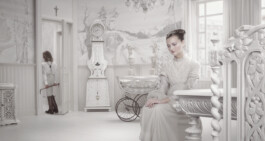
Dawn - the Mother © Erwin Olaf
An interview with Erwin Olaf about personal and political work, vulnerability and public attention.
Erwin Olaf, when we talked the last time, you said that you were planning to calm down a bit, keeping productions smaller, more intimate. Have you succeeded in doing so? Actually, you seem to be no less present than before.
I intended to calm down a bit in 2011, but sometimes things are just out of my hands, like for instance with the Dutch state prize for the arts – the Johannes Vermeer Award – which I received in 2011. This acknowledgement brought a lot of press with it, as it is a huge honour to receive this accolade. Another project which garnered a lot of attention was the photographic project that I did for the celebration of the Siege and Relief of Leiden. This was a huge project and once finished it received a lot of attention.
Looking at your work, less at the public reactions: how important is the notion of intimacy? Many of your latter works show a certain humbleness, or shyness. On the other hand, also your earlier – one could say a bit „louder“ – works dealt with that notion, maybe just in another way. Which role does physicality, the bare body, sexuality play in this sense; has this changed for you?
I have grown “sadder and wiser”... You cannot hold on to the same personal image that you have when you are in your early 30s. Nowadays I don’t have the need to make a lot of noise to get attention. Also my personal views on these matters have changed. I believe that the so-called “big emotions” – like screaming, crying, etc. – are shallow emotions on TV nowadays. In the media it seems that everyone is trying to score quickly with bigger-than-life emotions, so my work in the recent years has also been a reaction to this. I prefer to use smaller gestures. Another thing is that I have always been fascinated with (bare) skin. People often mistake this fascination as a fascination for sex but that’s not so much the case. That fascination is more aesthetic than sexual.
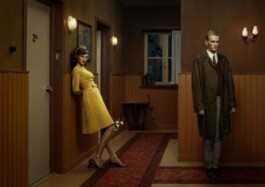
Hope, 2005 © Erwin Olaf
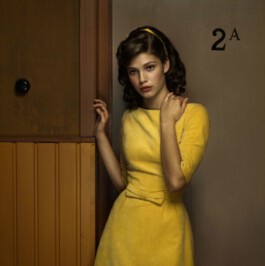
Hope Portraits, 2005 © Erwin Olaf
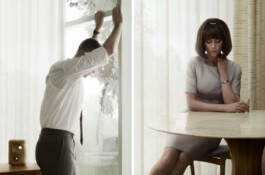
© Erwin Olaf
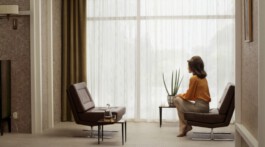
© Erwin Olaf
Does intimacy and emotion as terms of an artistic approach mean that you yourself become vulnerable through your work? Does your approach include a sense of transcendency or spirituality; do you think in terms of spirituality or even religion, does it matter for your work?
I am not spiritual at all. I have not been raised spiritually. For me religion and spirituality are the same. With my personal work, the starting point is usually a technical problem – or challenge – on the one hand, and the layered emotion or idea on the other hand. Personal work, I think, should always say something about the maker. You should show something of yourself in your work, expose a bit. By putting yourself out there you make yourself subject to criticism, you make yourself vulnerable. I think this goes together. Being vulnerable should not keep me from making personal work, because it also always leads to new things and developments.
We know that you have always been very aware of political situations and processes, specifically in the Netherlands. Could becoming quieter in a way be considered as becoming less political, as a kind of withdrawal? Or, just on the contrary, do you see these approaches as leading back to political questions?
My work will always be political, because that is something that interests me. Not just in the Netherlands, but also abroad. My series “Paradise the Club” (2001) and “Rain” (2004) are political comments on a larger scale. I don’t withdraw, but I don’t like to put the message straight in your face. I prefer to lure you with an aesthetic outside, and then let the second layer sink in. The second layer is also not a direct one, as I don’t really like to tell people what to think. It’s better if they start thinking about a subject, instead of telling them straight out what I feel or think.
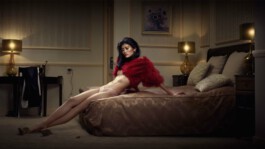
© Erwin Olaf
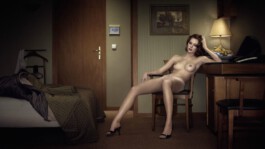
© Erwin Olaf
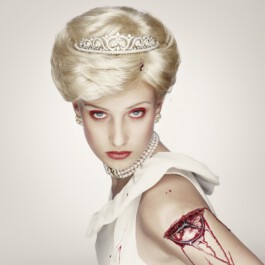
Lady Di © Erwin Olaf
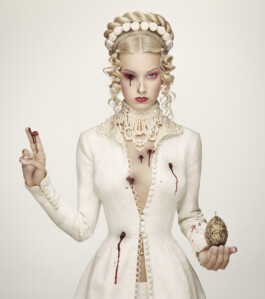
Tsarina Alexandra © Erwin Olaf

Valentino © Erwin Olaf
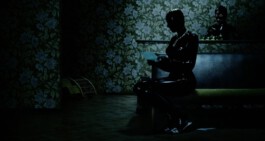
Seperation, 2003 © Erwin Olaf
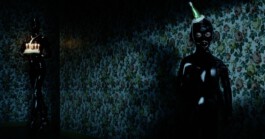
Seperation, 2003 © Erwin Olaf
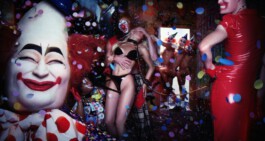
© Erwin Olaf
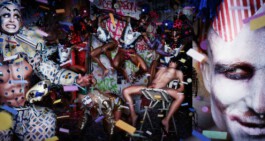
© Erwin Olaf
Profil
Erwin Olaf, born in Hilversum in 1959, entered the international art scene in the late 1980s. Besides photography he has also been involved in video and film. He has worked for magazines such as The New York Times Magazine, The Sunday Times Magazine, Elle, and Citizen K, has done commercials for i. a. Lavazza, Microsoft and BMW, and his work has been shown in numerous international solo shows. He received many international awards including the Dutch state prize for the arts, the Johannes Vermeer Award.
Erwin Olaf died in September 2023.
www.erwinolaf.com
© Cover Portrait: Feriet Tunc

I am - Selfportrait 2009, © Erwin Olaf